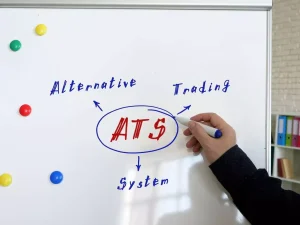The field of finance is developing rapidly, so new experts appear just as quickly to help novice traders navigate their way to success. Broker-dealers are specialists who excel in securities trading and client account management. These experts facilitate the buying and selling of financial assets. They manage client portfolios, contributing significantly to the efficient functioning of the financial ecosystem. In the article, we’ll learn more about these companies and touch on the types of broker dealers.
Broker-Dealer Definition
Broker-dealers (BD) trade securities for personal accounts and on behalf of their clients. These experts might be either stand-alone firms or divisions of more significant financial institutions. BDs are prohibited from offering the services unless they possess the necessary licenses, and they must be listed by regulatory bodies — SEC and FINRA.
In the realm of cryptocurrency and FX, broker dealers have various duties. They play a complex role in asset management. However, their primary responsibility is to mediate between those who sell and purchase assets. Let’s look at other services you can expect to get from BD:
- Experts provide investment recommendations.
- They carry out trading and supervise client accounts.
- They thoroughly research and analyze markets to accurately identify potential investment opportunities and associated risks.
To be transparent, they pledge to always act in their customers’ best interests by being open and honest about all expenses, commissions, and potential conflicts of interest.
Broker-dealers serve a vital purpose of ensuring liquidity in the market. They’re willing to buy and hold financial assets, which helps other market participants execute their deals faster.


Turnkey Brokerage Solution For Your Business
Get the most profitable fully licensed fx/crypto brokerage software or ready-to-operate business in 48 hours. Best-in-class web & mobile trading platforms, sales-driven CRM, full integration with MT4/5, and 150+ payment providers.
How Do Broker-Dealers Work?
When you want to buy or sell financial assets, you go to a broker dealer. They receive the order and direct it to the market where these assets are traded. They try to fulfill the order at the best possible cost available.
In addition, a broker dealer can be a dealer himself, that is, an owner of financial assets. They may buy back and hold purchases on its balance sheet, ready to sell them to you when you decide to purchase or to buy from you when you choose to sell. They also provide liquidity in the market by offering assets for purchase.
Their brokerage fee is usually called a spread. It’s a difference between the bid and ask price. These are the prices at which they’re ready to buy (bid) and sell (ask) the asset. There are several kinds of commissions. Some charge fixed fees per deal, while others charge a percentage of the total sales volume. Some BDs may combine these charges.
The price of the services will ultimately depend on which broker you use. As an illustration, specialists who provide a wide range of services impose on clients an average of 1% to 2% of the transaction’s value. Discount and online brokerages offer significantly lower fees, often setting flat rates of $0 to $30 per deal.
Types of a Broker-Dealer
There are various types of broker dealers. As an illustration, it can be massive corporations, or they might be smaller independent businesses. Let’s touch on the two most popular types.
Wirehouse
If you are seeking a comprehensive set of services, it’s the type to choose. Organizations of all sizes, from small offices to well-known global institutions, can be wirehouse brokers. Here, you take advantage of these companies’ unique selection of products – stocks, ETF, options, etc. Morgan Stanley, a multinational investment bank, and Charles Schwab Corporation, a financial services company, are the primary examples of broker dealers that have become stars in this domain. Wirehouse brokers will work with you as an employed representative, following the guidelines set by their employer.
Independent
These are smaller businesses compared to the wirehouse. IBDs are not owned by large firms or banks. Their advantage is that you get a more extensive range of investment options from outside sources. For you, it means a more personalized portfolio. Even if the price for services is higher here, it’s compensated by the breadth of offers.
The clients benefit from stocks, bonds, and initial public offerings (IPOs). Moreover, it’s your best bet if you require financial planning advice or someone to manage the portfolio.
Because independent broker dealers are typically smaller, regulators often pay less attention to them. Thus, the brokerage firm has full control over its operations.

Types of Fees of a Broker-Dealer
There are various kinds of commissions on brokerage services. Let’s look at the fundamental types.
Full-service fee
If you go with a full-service company, you can expect to pay this type of fee. 1% to 2% of the total sales or investment is usually a standard commission. It’s a reasonable price for consulting you, evaluating the portfolio, helping plan retirement, and more. It also includes the fee for using a scope of instruments offered by full service brokers.
Online brokerage fees
Flexible and fast trading is what attracts users of Internet brokers. Even though the scope of the services may not be so broad, commission-free trading is a real cherry on the cake. The highest charge for online brokerages is usually $30 per deal.
Discount brokerage fees
Here, you expect a limited selection of products. Moreover, such brokers don’t advise or provide financial instruments. Nevertheless, it has its advantages. The main benefit is lower costs compared to standard commissions. They charge you from $5 to over $30 per transaction.
RIA vs Broker-Dealer
Broker-dealers have several distinctions from the Registered Investment Advisors (RIA). Let’s highlight the areas where RIA vs broker dealer differ:
Client relationships
BDs have a standard of suitability. It’s a guarantee the investment corresponds to the client’s circumstances. However, it doesn’t mean that the client’s interests are more priority than the interests of the broker.
RIAs operate under fiduciary standards. The client’s interest is a top concern. Here, you will never receive advice that will harm your portfolio. Such specialists act only in your interests.
Services offered
Brokers deal with securities on behalf of clients. You may also find specialists who manage a portfolio, plan finances, etc.
RIA will be a klondike for those seeking an almost unlimited spectrum of services. They’ll help you choose asset allocation strategies, plan taxes or retirement, and analyze cash flows.
Licenses
BDs cannot officially operate if regulatory authorities do not supervise them. Series 7 license and other broker dealer registration documents may also be necessary.
Series 65 license and state or federal financial regulator registration are a must for RIAs. Although they also register with securities regulators, their licensing requirements are more streamlined.
Costs
Broker-dealer services are a coin with two sides — on the one hand, you get lower commissions. On the flip side, you get limited services that often lack advanced financial guidance or planning services.
Along with a more comprehensive scope of RIA services comes higher costs. Providing more full-range services frequently necessitates utilizing more resources and knowledge, which raises costs.
In summary, navigating the complex world of broker-dealers requires a nuanced understanding of their roles, responsibilities, and fee structure. It’s difficult to overestimate the role of these experts in the financial markets because they make trading easier for investors.
XCritical emerges as a critical solution to empowering your FX brokerage journey. Whether you’re looking to start your own highly profitable FX brokerage or expand your existing business, XCritical provides best-in-class software to streamline your operations and increase profitability. The company’s solutions can help you streamline processes by reducing costs and collecting and managing data.






